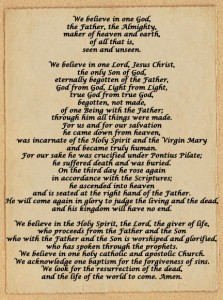
I assumed that early on Catholics deviated from “biblical Christianity” so they simply invented a new word to describe their new society. Since we Evangelicals were supposedly the ones faithful to the Bible we had no interest in the word catholic since it was found nowhere between the covers of the Bible. It was a biased word loaded with negative baggage so we removed it from the Creed.
I should have asked myself “Where did the word catholic come from, and what does it mean?” Was I right to assume that Roman Catholics invented the word to set themselves apart from biblical Christianity?
A short and interesting investigation will turn up some valuable information. Let’s start with an understanding of doctrinal development and the definition of catholic, then let’s “interview” the very first Christians to see what they thought of the Church and the word catholic and then we will study the Bible itself.
How Doctrines and Words Develop
The development of doctrine is not just a Catholic phenomenon. It is also a fact among Protestants and all religions or theological traditions. Over time, theological words develop to help explain the deeper understanding of the faith. As Christians ponder the revelation passed on by the apostles and deposited in his Church the Church mulls over God’s Word, thinking deeper and deeper. It is not unlike peeling the layers away from an onion as one goes deeper to the heart.
Development of doctrine defines, sharpens, and interprets the deposit of faith. The Bible is not a theological textbook or a detailed church manual, such as say a catechism or study guide. The Bible’s meaning is not always clear as St. Peter tells us (2 Pet 3:15?16). Thirty-three thousand competing Protestant denominations also make this fact apparent as they fail to agree on what the Bible says. It takes the authority of a universal Church and the successors of the apostles to formulate the doctrines of the faith. As an Evangelical, I was naïve enough to think I could recreate the “theological” wheel for myself.
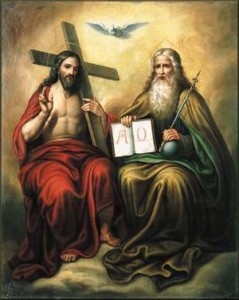
Interestingly, while many Protestants object to the idea of development of doctrine within the Catholic Church, they seem to have no problem with developments in their own camp—even novelties and inventions. Take for example the Rapture, another word not found in the Bible and not used in any theological circles until the mid-19th century. After a prophetic utterance from two women at a Scottish revival meeting, the new doctrine of the Rapture spread like wildfire through England and America.
It was the Catholic Church that defined the Blessed Trinity, the divinity and humanity of Christ—the hypostatic union of two natures in the one divine person of Jesus—, salvation, baptism, the Blessed Eucharist, and all the other doctrines that have been the bedrock of the Christian faith. It is also the Catholic Church that gave birth to the New Testament—collecting, canonizing, preserving, distributing, and interpreting them.
As a Protestant I was quite willing to unknowingly accept the Catholic Church’s teaching on the Trinity, the deity of Christ, the closed canon of the New Testament, etc., but I willfully rejected the full teaching of the Catholic Church. I now realize that it is in the Catholic Church that we find the fulness of the faith and the visible, universal body of Christ.
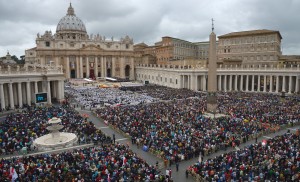
However, we have yet to define the word catholic. It comes from the Greek katholikos, the combination of two words: kata- concerning, and holos- whole. Thus, concerning the whole. According to the Oxford Dictionary of English Etymology, the word catholic comes from a Greek word meaning “regarding the whole,” or more simply, “universal” or “general.” Universal comes from two Greek words: uni- one, and vertere- turning. In other words, a “one turning”, “revolving around one,” or “turned into one”. The word church comes from the Greek ecclesia which means “those called out,” as in those summoned out of the world at large to form a distinct society. So the Catholic Church is made up of those called out and gathered into the universal visible society founded by Christ.
In its early years, the Church was small, both in geographically and numerically. For roughly the first decade the Church was made up exclusively of Jews in the area of Jerusalem. The word catholic hardly seemed to apply. But as the Church grew and spread across the Roman Empire, it incorporated Jews and Gentiles, rich and poor, Romans, freemen, and even slaves—men and women from every tribe and tongue. But by the third century, oneout of ten people in the Roman Empire was a Catholic. Just as the word Trinity was appropriated to describe the nature of God, so the term catholic was appropriated to describe the nature of Christ’s body, the Church.
But let’s get back to the history of the word catholic. The first recorded use of the word is found very early in Christian literature. We find the first instance the writings of St. Ignatius of Antioch who was a young man during the time of the apostles and the second bishop of Antioch following Peter. Ignatius was immersed in the living tradition of the local church in Antioch where the believers in Christ were first called Christians (Acts 11:26). He was alive early enough to know the apostles and was taught and ordained directly by the apostles.
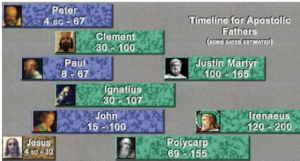
In the existing documents that have come down to us, St. Ignatius is the first to use the word catholic in reference to the Church. On his way to Rome, under military escort to the Coliseum where he would be devoured by lions for his faith, he wrote, “You must all follow the bishop as Jesus Christ follows the Father, and the presbytery as you would the Apostles. Wherever the bishop appears, let the people be there; just as wherever Jesus Christ is, there is the Catholic Church” (Epistle to the Smyrnaeans, 8).
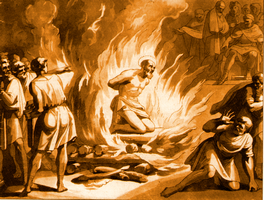
Later in the same book it says, “When Polycarp had finished his prayer, in which he remembered everyone with whom he had ever been acquainted . . . and the whole Catholic Church throughout the world.” They then gave him up to wild beasts, fire and finally, the sword. The epistle then concludes, “Now with the Apostles and all the just [Polycarp] is glorifying God and the Father Almighty, and he is blessing our Lord Jesus Christ, the Savior of our souls, and the Shepherd of the Catholic Church throughout the world” (8).
So we clearly see that early in the second century Christians regularly use the word catholic as an established description of the Church. From the second century on we see the term catholic being used consistently by the theologians and writers. One can easily conclude that catholic was a very early description of the Church, probably used by the apostles themselves
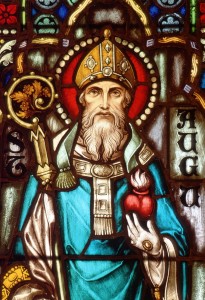
The early usage and importance of the word can also be seen by its use in both the Apostles and the Nicene Creeds. If you were a Christian in the first mellenia you were a Catholic, and if you were a Catholic you recited the Creeds affirming the “one holy, catholic, and apostolic Church.” Unhappily, some people today try to make a distinction between Catholic with a capital “C” and catholic with a small “c”, but such a distinction is a recent development and unheard of in the early Church.
Biblical Understanding of the word “Catholic”
Jesus commissioned his apostles with the words “Go therefore, and make disciples of all nations, baptizing them in the name of the Father and of the Son and of the Holy Spirit, teaching them to observe all that I have commanded you. And behold, I am with you always, until the end of the age” (Mt 28:19, 20). As Frank Sheed reminds us, “Notice first the threefold ‘all’—all nations, all things, all days. Catholic, we say, means ‘universal.’ Examining the word ‘universal,’ we see that it contains two ideas, the idea of all, the idea of one. But all what? All nations, all teachings, all times. So our Lord says. It is not an exaggerated description of the Catholic Church. Not by the wildest exaggeration could it be advanced as a description of any other” (Theology and Sanity [San Francisco, CA: Ignatius Press, 1993], 284).
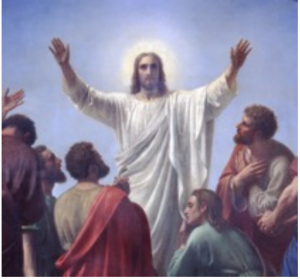
One can see the sad state of “Christendom” today by comparing Jesus’ words about “the Church” with the current situation. If a Methodist offends a Baptist, or a Presbyterian offends a Pentecostal, which “church” do they take it to for adjudication? This alone demonstrates the problem when 33,000 plus denominations exist outside the physical bounds of the “one holy, catholic, and apostolic Church.” Jesus expected there to be one universal, authoritative, visible and Catholic Church to represent him on earth until his return.
Just before he was crucified, Jesus prayed not only for the universality and catholicity of the Church, but for her visible unity:
“[T]hat they may all be one; even as You, Father, are in Me and I in You, that they also may be in Us, so that the world may believe that You sent Me. The glory which You have given Me I have given to them, that they may be one, just as We are one; I in them and You in Me, that they may be perfected in unity, so that the world may know that You sent Me” Jn 17:21?23 NASB).
The early Church understood Jesus’ words. What good was an invisible, theoretical, impractical unity? For the world to see a catholic unity, the oneness of the Church must be a visible, real, physical, and visible reality. All of this the Catholic Church is. Since the earliest centuries Christians have confessed that the Church is “one, holy, catholic and apostolic.” One because there is only one, visible, organic, and unified Church; holy because she is called out of the world to be the Bride of Christ, righteous and sanctified; catholic because she is universal, unified, and covers the whole world; apostolic because Christ founded her (Mt. 16:18) through his apostles, and the apostles’ authority are carried on through the bishops. Through the centuries, this creed has been the statement of the Church.
In these last days, Christians need to stand confident and obedient in heart of the Catholic Church. She has been our faithful Mother, steadfastly carrying out the mandate of Jesus Christ for 2,000 years. As an Evangelical Protestant I thought I could ignore the creeds and councils of our Mother, the Church. I was sadly mistaken. I now understand that Jesus requires us to listen to His Church, the Church to which he gave the authority to bind and to loose (Mt 16:19; 18:17)—the Catholic Church, which is the pillar and foundation of the truth (1 Tim 3:15).
Steve Ray is the author of Crossing the Tiber, Upon this Rock, and St. John’s Gospel. You can contact him at his website at www.CatholicConvert.com.



This Post Has 6 Comments
Pingback: The Papcy, Part 2: Left in Charge | catholic4areason
Thank you so much, Steve, for writing this article. It has become exceedingly helpful in St. John’s 5/6th grade religious formation class that will be studying “Big T” Tradition this year. You are a rockstar. Pax.
I want to learn all about the new Catholic I am from the old Catholic ways.I pray Jesus will help me learn it.I was Born in Brooklyn New York. So I ask Jesus will helps me I am Hungry to learn all he has for me.
Pope Benedict XVI:
“It was the error of the Reformation period that for the most part we could only see what divided us and we failed to grasp existentially what we have in common in terms of the great deposit of sacred Scripture and the early Christian creeds. For me, the great ecumenical step forward of recent decades is that we have become aware of all this common ground, that we acknowledge it as we pray and sing together, as we make our joint commitment to the Christian ethos in our dealings with the world, as we bear common witness to the God of Jesus Christ in this world as our inalienable, shared foundation.”
“what is this new form of Christianity saying to us, for better and for worse?
…In any event, it raises afresh the question about what has enduring validity and what can or must be changed – the question of our fundamental faith choice.”
“As the martyrs of the Nazi era brought us together and prompted that great initial ecumenical opening, so today, faith that is lived from deep within amid a secularized world is the most powerful ecumenical force that brings us together, guiding us towards unity in the one Lord. And we pray to him, asking that we may learn to live the faith anew, and that in this way we may then become one.”
From: The Pope, Martin Luther, and Our Time
catholicworldreport
Mark Brumley, president and CEO of Ignatius Press.
Thank you for this article. As a new convert, I am always eager to know more, and know it clearly.
I realize the author is much more intelligent and informed of the history of man and his doctrines than I can ever hope to be. But even with all of this wisdom I sense of leaving off of the path of what and who the original body of Christ and church is and meant to be. Man has added doctrines and words throughout the years in many organized religions, that mislead faithful followers of Christ by adding celebrations and ways of worshiping our Lord. The word trinity is not found in the bible but does not seem wrong to use it, as it seems to be accurate with the use of "Father, Son and Holy Ghost". On the other hand, using the word "purgatory" as an actual place that is not heaven or hell, where people exist, waiting or hoping to be taken out of by prayers of loved ones, does not, as far as I have learned, exist in the bible. One other celebration I have trouble with is using blessed Mary as an intercessor to pray to God instead of the Holy Spirit and Jesus Christ himself. Not diminishing the Holiness of Mary but using her for reaching reaching our Father in prayer, I cannot find it in God's word. I must say that I am formally unlearned and uneducated in God's word but have self studied and read, besides the bible, many many opinions and interpretations. It can be over whelming and I may be wrong in much of my thinking and discerning God's word but I have to believe and stay as strictly as I am capable of, to what is in the bible. So many people are much more informed than I am of which Mr. Ray certainly is, I can only say that I mean no disrespect to him and sometimes I think it might be wiser to keep my thoughts to myself, rather than interfere with a person's faith. I pray for God to give me clarity to this. God bless you.
STEVE RAY HERE: I am moderating this comment to be allowed since the writer is very sincere and has a good heart. Hopefully someone has the time to answer the questions. But for one, the objection to “praying to Mary” I would simply say that as Catholics we believe Mary is alive and in heaven. We do not pray to her as to God but ask her to pray for us. It is no different than asking your friend to pray for you. For anyone who wants answers to the questions and objections above, simply refer to http://www.CatholicConvert.com/resources where I have answered so many of these things.
Comments are closed.